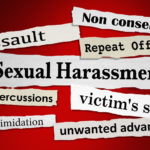Category Archives: Sexual Harassment

Can A Sexual Harassment Victim Bring A Battery Claim Against The Sexual Harasser?
Title VII of the Civil Rights Act of 1964 (Title VII) and the Florida Civil Rights Act (FCRA) protect employees against sexual harassment in the workplace. Unfortunately, as our Alachua County, Florida sexual harassment attorneys have learned, circumstances sometimes prevent sexual harassment victims from bringing or prevailing on otherwise meritorious sexual harassment lawsuits against… Read More »

Can Degrading & Humiliating Conduct Create A Sexual Hostile Work Environment?
Under Title VII of the Civil Rights Act (Title VII), employees are protected from sexual harassing behavior which is sufficiently severe or pervasive to discriminatorily alter the conditions of the victim’s employment and create a hostile work environment. In determining whether the harassment was sufficiently severe or pervasive to create an abusive working environment,… Read More »

Are Employees Protected From Sexual Harassment Following A Failed Relationship?
Sexual harassment is a form of sex discrimination prohibited by Title VII of the Civil Rights Act of 1964 (Title VII). As observed by the U.S. Tenth Circuit Court of Appeals in Gross v. Burggraf Construction Co., 53 F.3d 1531 (10th Cir. 1995), sexual harassment is behavior “that would not occur but for the… Read More »

Are A Sexual Harasser’s Threats Of Physical Harm Part Of A Victim’s Hostile Work Environment?
Under Title VII of the Civil Rights Act of 1964 (Title VII), sexual harassment that is sufficiently severe or pervasive to discriminatorily alter the conditions of a victim’s employment and create a hostile working environment is an unlawful employment practice. In Harris v. Forklift Systems, Inc., 510 U.S. 17 (1993), the U.S. Supreme Court… Read More »

Florida Federal Court Allows Case Of Same-Sex Sexual Harassment To Go Forward
Sexual harassment is a form of sex discrimination made unlawful by Title VII of the Civil Rights Act of 1964 (Title VII). Prohibited sexual harassment under Title VII is not limited to harassment by employees of the opposite sex. Rather, Title VII also makes same-sex sexual harassment unlawful. Same-sex sexual harassment is unlawful under… Read More »

Florida Federal Court Rules That Employer Is Strictly Liable For Alleged Sexual Harassment By Company Owner
Under Title VII of the Civil Rights Act of 1964 (Title VII), an employer’s liability for sexual harassment depends on whether the harasser is the victim’s supervisor or merely a co-employee. In Faragher v. City of Boca Raton, 524 U.S. 775 (1998) and Burlington Indus., Inc. v. Ellerth, 524 U.S. 742 (1998), the U.S…. Read More »

Male Employee Told Deal With Sexual Harassment From Female Employee By Putting On His “Big Boy Pants”
Title VII of the Civil Rights Act of 1964 (Title VII) makes sexual harassment which is sufficiently severe or pervasive to alter the conditions of the victim’s employment and create an abusive work environment unlawful. Having represented sexual harassment victims for almost twenty years, our Central Florida hostile work environment harassment attorneys have learned… Read More »

Appellate Court Rules That Employee Is Not Required To Quit In Order To Bring A Sexual Harassment Lawsuit
Title VII of the Civil Rights Act of 1964 (Title VII) makes sexual harassment that is sufficiently severe or pervasive to alter the conditions of the victim’s employment and create a hostile working environment an unlawful employment practice. As part of establishing a prima facie case of hostile work environment sexual harassment, a victim… Read More »
Federal Court Rules That Exotic Dancer Is Protected Against Unwelcome Sexual Harassment At Her Workplace
In order to establish a claim of hostile work environment sexual harassment, a victim must demonstrate that the harassment was unwelcome. As explained by the U.S. Supreme Court in Meritor Sav. Bank, FSB v. Vinson, 477 U.S. 57 (1986), that the conduct in question is unwelcome is “the gravamen of any sexual harassment claim.”… Read More »

An Employer’s Bad Faith Investigation Of A Sexual Harassment Complaint: Instructing A Witness To Provide Misleading Information
Title VII of the Civil Rights Act of 1964 (Title VII) protects employees from sexually harassing behavior that is sufficiently severe or pervasive to create a hostile or abusive working environment. Once an employer knows or should know that an employee is being subjected to sexually harassing behavior, a remedial obligation is triggered. The… Read More »


 Close Menu
Close Menu